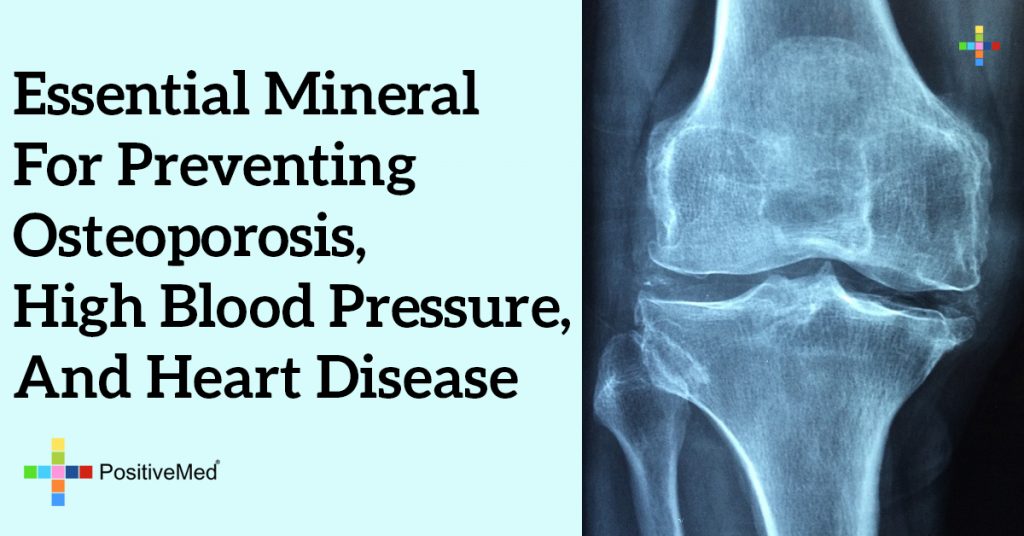
Essential Mineral for Preventing Osteoporosis, High Blood Pressure, and Heart Disease
[nextpage title=”…”]
Magnesium is one of the most essential minerals and cofactors for enzymes in the body. It is involved in numerous physiologic pathways including protein synthesis, energy production, nucleic acid synthesis, ion transport, and cell signaling. Severe magnesium deficiency is referred to as hypomagnesaemia. This condition can impede calcium homeostasis and vitamin D. This deficiency has been associated with a high risk of osteoporosis, cardiovascular disease and metabolic disorders like diabetes mellitus and hypertension. Some preliminary studies have revealed that magnesium intake improves insulin sensitivity in people at risk of diabetes.

Magnesium and Prevention of Osteoporosis
The primary feature of osteoporosis is reduced bone mineral density (BMD). However, changes in the mineral fracture and collagenous matrix may also result in brittle bones that are susceptible to fracture. Magnesium makes up 1 percent of bone mineral. It influences bone mineral metabolism as well as bone matrix.
In addition, inadequate levels of serum magnesium results in low levels of serum calcium, as well as resistance to effects of calcitriol (vitamin D) and parathyroid hormone (PHT) action. These factors lead to an increase in bone loss. Magnesium intake has been positively associated with increased bone mass density (BMD) in both men and women. However, further research is necessary to show the exact effect of magnesium on bone density.
Magnesium and High Blood Pressure
Magnesium intake has been positively associated with having a therapeutic benefit in treating hypertension. Supplemental magnesium lowers blood pressure in hypertensive individuals. However, it does not reduce blood pressure in normotensive individuals. Oral magnesium intake is necessary for hypertensive individuals who have decreased levels of magnesium in their body due to inadequate dietary intake or chronic diuretic use.
However, other factors also play a significant role in the reduction of blood pressure. These include adherence to a DASH diet that is rich in low-fat dairy, vegetables and fruits while low in total and saturated fats. In addition, antihypertensive medication like diuretics are also needed.
Magnesium and Heart Disease
Common risk factors that are associated with cardiovascular disease such as hypertension, high LLD cholesterol, metabolic syndrome and low HDL cholesterol are also associated with low dietary intake of magnesium.
RELATED ARTICLE: 5 FOODS THAT HELP TO LOWER BLOOD PRESSURE
[/nextpage] [nextpage title=”…”]
Since magnesium is the common denominator of almost all risk factors for heart disease, it only makes sense that more research should be done to look at this efficient mineral as a possible treatment for the disease.
A high level of magnesium is found in the heart, more specifically the left ventricle. In addition, this mineral allows calcium to enter muscle cells in order to cause contraction. It later ushers calcium from the cell. Absence of magnesium from this channel causes calcium to flood muscle cells leading to hyper contraction of these cells. This translates to angina or even heart attack.
How to Identify Magnesium Deficiency in the Body
Magnesium deficiency can easily go unnoticed in people with heart disease and other conditions. Some magnesium deficiency symptoms include:
• Acid reflux
• Anxiety
• Constipation
• Kidney stones
Due to the low levels of magnesium in the bloodstream (about 1 percent), its deficiency cannot be tested on common chem screens along with other minerals like potassium, sodium and calcium. However, its deficiency can be tested using the red blood count (RBC) magnesium test. Annual screening is advised.
READ ALSO: Why You Should Never Skip a Blood Test
Recommended Dosage
The recommended levels of magnesium intake from dietary sources is 310-320 mg/day in females and 400-420 mg/day in males – over 31 years old. Additionally, supplemental magnesium should not exceed 350 mg/day in both sexes.
Sources of Magnesium
• Magnesium is one of the constituents of chlorophyll. Therefore, green leafy vegetables are a rich source of this mineral. These include spinach and kale.
• Supplemental magnesium sources include magnesium oxide, magnesium chloride, magnesium citrate salts and magnesium gluconate. In addition, there are several amino acid chelates available like magnesium aspartate.
• Unrefined whole grains like brown rice
• Nuts like peanuts and hazelnuts
• Meat and milk have intermediate content of the mineral.
• Cereals like all bran, oat bran and wheat.
• Almonds
• Swiss chard
• Lima beans
• Molasses, blackstrap
• Okra
• Fruits like the banana
Magnesium plays an important role in the function and structure of the body. The human body contains at least 25 grams of the magnesium mineral. The human skeleton contains over 60 percent of magnesium that is found in the body, 27 percent is found in the muscle, 7 percent in other body cells and 1 percent is found in the blood. Additionally, magnesium is involved in over 300 crucial metabolic reactions in the body.
[/nextpage]





